While everyone feels anxious from time to time, some people experience these feelings so intensely that it affects their everyday lives. Some describe it like their mind is a car that just keeps accelerating – they can’t slow their thoughts down. The good news is that with help most people can completely recover from their anxiety disorder or at least learn to cope with it.

Anxiety disorders are the most common mental disorders in Australia. Nearly one in seven people will experience some type of anxiety disorder in any one year – about one in six women and one in 10 men. One in four people will experience an anxiety disorder at some stage of their lives.
Nurse Practitioner in Psychiatry and lecturer in Clinical Psychology at Sydney University Toby Raeburn works out of an outreach psychology clinic that services clients from the Gandangara Aboriginal Medical Service (AMS). This AMS covers the greater south-western Sydney area from Liverpool to Moss Vale.
Toby says Aboriginal and Torres Strait Islander people suffer from mental illness at rates three times higher than the rest of the Australian population with anxiety disorders the most common.
“I see a lot of undiagnosed anxiety when working with Aboriginal health clinics. I often come across inter-generational trauma – and Aboriginal people never access services until quite late. One of the struggles in the health system is getting young Aboriginal people to attend treatment and then coming up with modes of care to reach out to young Aboriginal people who may be suffering from mental illness,” Toby says.
“There is Stolen Generation stuff but there is also more general stuff like dealing with domestic violence and inter-generational alcohol and drug abuse.”
He says the trouble with anxiety disorders is that people often try to cope by isolating themselves.
“There are surprisingly high numbers of people in urban south-western Sydney who are young. A lot of them are from single-parent families and they are developing anxiety and responding to it by isolating themselves in their own homes and it is very hard then to reach out to these people, so we try see them in their own homes,” Toby says.
Toby says anxiety disorders can be treated effectively, so they don’t have to become debilitating.
“The good news for these disorders is that there are some really effective treatments, as opposed to some of the less prevalent mental illnesses like schizophrenia, but with anxiety – if we can get them some cognitive behaviour therapy, or get them exercising, or having graded social exposure and working with their social supports – there is a very high rate of recovery, but it often takes about 3 to 6 months,” he says. Toby says some of his patients refer to anxiety as ‘doing head miles’.
“It may be that they notice they are just worrying about all sorts of things – they call it ‘doing head miles’ – my Aboriginal patients use this term – churning over the details of conversations they have had, the places they have been, it starts to feel like they are losing control of their thinking.
“It is like driving a car and taking the foot off the accelerator but the car is still accelerating. You can’t slow your thoughts down – and often they have sleep problems – that is a very common symptom.
“Some of the physical symptoms often include a racing heartbeat, hyper-sensitivity to sensations in your body, sweating, hyper-ventilating, chest pains that can feel like a heart attack – it is quite scary. There can also be near fainting and shaky knees or legs for no apparent reason.”
“It is like the idea of the butterflies in the stomach that people get before performing or speaking, which is a reasonably common feeling – but imagine getting those feelings for no apparent reason? It is also like the feeling you might get if you cross a road and see a big truck coming towards you – that sudden fright – imagine getting that feeling all the time?”
Toby says if people are having these symptoms, the first thing they can do is check some free websites out including: ecouch; MoodGym; Reach out; the Inspire foundation; also the Emotional Health Clinic on the Macquarie University website.
“It is important to remind yourself that you’re not a freak – you are going to be ok – with the right help you can get 100 per cent better.”
He says it is important to get along to your GP or local AMS.
“The GP should not just prescribe a tablet straight away – the best practice is some counselling with a psychologist – so you should be referred to someone like that for Cognitive Behaviour Therapy or Interpersonal Therapy. The research suggests that these types of counselling do work for people rather than tarot card readers or seeing other whacky therapists,” Toby says.
“A lot of people get better through counselling without medication, but 30 per cent may need to take a Selective Serotonin Reuptake Inhibitor such as Prozac or Zoloft.
“If the person does need to take a light anti-depressant medication for 6-12 months, they should try and keep the dosage as low as possible and use it for as short a period as possible. Physical exercise also helps a great deal.”
Comments are closed.